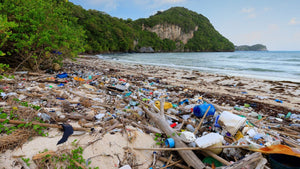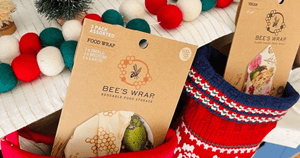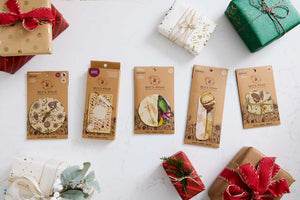The Life Cycle of Bee's Wrap®

Reducing our dependence on single-use plastics is the reason we’re here at Bee's Wrap®. We’ve been creating eco-friendly wraps for nearly a decade to provide a versatile, compostable, and durable solution for sustainable food storage.
We make Bee's Wrap® by infusing organic cotton with beeswax, organic plant oil, and tree resin. The result? A reusable and compostable wrap with zero plastic waste.
Not only is Bee's Wrap® a better alternative to plastic wrap, it’s also made entirely from natural ingredients, making it possible for Bee's Wrap® to fully break down in the soil when its life in the kitchen comes to an end.
The Beeswax in Bee's Wrap®
We pay close attention to the ingredients and materials we use in our production process. Bee's Wrap® fabric and printing are certified by the Global Organic Textile Standard (GOTS). Our beeswax is responsibly sourced, and we use only organic plant oils. The combination of sustainable ingredients creates a malleable, reusable, compostable food wrap.
As our name suggests, the heart of Bee's Wrap® is beeswax, which is renewable, and versatile.

We’re committed to sourcing beeswax from responsible beekeepers who are caring for healthy hives. Because without bees, the ecosystem as we know it would cease to exist.
Our beekeeper partners locate their hives away from areas of high pesticide use, such as golf courses and non-organic farms. This practice protects bees from pesticides, herbicides, and GMOs and helps prevent the accumulation of pesticides and herbicides in our wax. As an extra measure we test all of our beeswax for pesticides prior to use and reject over half based on our stringent internal standards
Working with responsible beekeepers means we’re evaluating their environmental impact, the health of their bee environment, and their quality end product. We also consider forage quality, the use of pesticides and medications, feeding and harvesting practices, hive construction, human intervention of natural bee cycles, and filtering processes.
We use wax in our wraps from honeycomb cappings, a byproduct of the honey extraction process. Bees seal their honeycombs with wax—which are the cappings—and beekeepers cut off those cappings to help the honey to come out. Removing the cappings and leaving the rest of the honeycomb intact allows the combs to be reused and sustained for many years.
We’re proud to work with beekeepers on the front lines of supporting a healthy, vibrant pollinator population. Bee's Wrap® beeswax is never chemically altered or bleached and is tested by the USDA for 200 pesticides and herbicides, ensuring the use of the cleanest possible wax.
Why Being Compostable Matters
Made from simple ingredients—beeswax, organic cotton, organic plant oil, and tree resin—Bee's Wrap® comes from the earth and is designed to return to the earth with zero waste.

When it comes to compostability, timelines can vary depending on the item and environmental conditions. For example, vegetables can take one month to break down in the environment, while a cotton t-shirt might take six months. It takes about a century for aluminum cans to biodegrade, while plastic bags never decompose.
Another challenge is that modern landfills are lined and packed tightly, creating an oxygen-poor environment where food can take several years to decompose.
Researchers from the University of Arizona scoured through landfills to find decades-old hotdogs, guacamole, lettuce perfectly preserved, as well as 25-year-old newspapers that were still readable. Instead of disintegrating, the researchers said the garbage in landfills is “mummified.”
That’s why composting is so important. Composting allows organic carbon to return to the earth and reduces greenhouse gases.
How to Compost Bee's Wrap®
Food waste, leaves, grass clippings, and other organic materials hold valuable nutrients that can go back to the soil after decomposition. When carried out correctly, food and compostable goods can break down in a few months, and the result is a healthy soil with a nutrient-rich makeup.

When your wrap has reached the end of its useful life—typically after about a year of regular use—you can add wraps directly to your backyard compost pile. Compost adds nitrogen to a garden, which contributes to a plant’s healthy, green growth.
To compost Bee's Wrap®, cut it into strips to add to your compost heap or bin. With a bit of time and the proper environmental conditions, your Bee's Wrap® will break down into compost for your home garden.
Simple, sustainable ingredients with a natural life cycle are the very foundation of Bee's Wrap®’s commitment to the planet.
We know that creating meaningful change doesn’t happen overnight. But taking simple steps adds up to a better planet for the next generation. Reducing the reliance on plastic takes time, and every effort we make together creates a future we can believe in.




